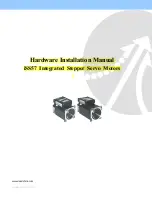
Goodrive350-UL Series VFD
Basic operation instructions
-115-
magnitude of the deviation itself. Differential control is used to control the feedback signal variation
based on the variation trend. Differential regulator should be used with caution as it may easily
enlarge the system interferences, especially those with high variation frequency.
When frequency command selection (P00.06, P00. 07) is 7, or channel of voltage setting (P04.27) is
6, the running mode of VFD is process PID control.
5.5.15.1 General procedures for PID parameter setting
a. Determining proportional gain P
When determining proportional gain P, first, remove the integral term and derivative term of PID by
making Ti=0 and Td=0 (see PID parameter setting for details), thus turning PID into pure proportional
control. Set the input to 60%–70% of the max. allowable value, and increase proportional gain P
gradually from 0 until system oscillation occurred, and then in turn, decrease proportional gain P
gradually from current value until system oscillation disappears, record the proportional gain P at this
point and set the proportional gain P of PID to 60%–70% of current value. This is whole
commissioning process of proportional gain P.
b. Determine integral time Ti
After proportional gain P is determined, set the initial value of a larger integral time Ti, and decrease Ti
gradually until system oscillation occurred, and then in turn, increase Ti until system oscillation
disappears, record the Ti at this point, and set the integral time constant Ti of PID to 150%–180% of
current value. This is the commissioning process of integral time constant Ti.
c. Determining derivative time Td
The derivative time Td is generally set to 0.
If users need to set Td to another value, set in the same way with P and Ti, namely set Td to 30% of
the value when there is no oscillation.
d. Empty system load, perform load-carrying joint debugging, and then fine-tune PID parameter until
fulfilling the requirement.
5.5.15.2 How to fine-tune PID
After setting the parameters controlled by PID, users can fine-tune these parameters by the following
means.
Control overmodulation: When overmodulation occurred, shorten the derivative time (Td) and
prolong integral time (Ti).
Before adjustment
After adjustment
Response
Time t
Stabilize the feedback value as fast as possible:
when overmodulation occurred, shorten integral
















































